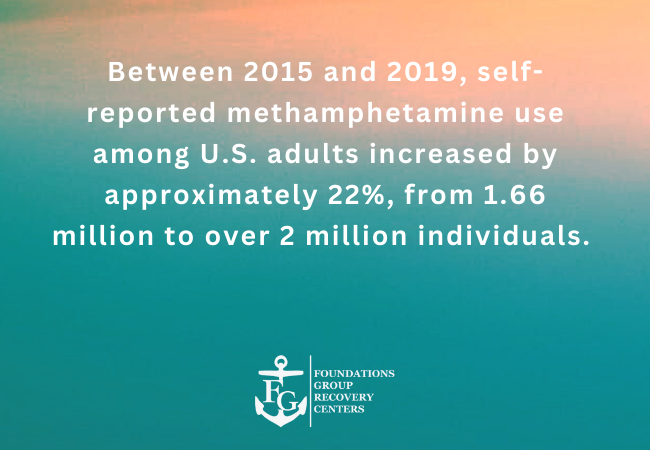Methamphetamine addiction is one of the most challenging substance use disorders to overcome due to its profound impact on brain function, high relapse rates, and severe withdrawal symptoms. Unlike opioid addiction, which can be managed with medication-assisted treatment (MAT), methamphetamine addiction primarily relies on behavioral therapies to help individuals develop healthy coping mechanisms and sustain long-term sobriety.
At Foundations Group Recovery Centers, we provide comprehensive meth addiction treatment in Massachusetts, utilizing evidence-based behavioral therapies within our Day Treatment Programs, Half-Day Treatment Programs, and Outpatient Addiction Treatment. These therapeutic approaches are crucial for individuals recovering from meth addiction, helping them manage cravings, develop new thought patterns, and rebuild their lives in a meaningful way.
This guide explores:
- The importance of behavioral therapy in meth recovery
- The most effective behavioral therapy techniques
- How therapy helps repair the brain after meth use
- The long-term benefits of behavioral therapy
- A new section on supporting a loved one through behavioral therapy for meth addiction
Why Behavioral Therapy is Essential in Meth Addiction Treatment
Methamphetamine addiction causes severe changes to the brain’s reward system, making it difficult for individuals to quit using without structured intervention. Unlike alcohol or opioid addiction, which can be managed with medications such as naltrexone or methadone, methamphetamine addiction is best treated through intensive behavioral therapy.
The Impact of Methamphetamine on the Brain
Meth floods the brain with dopamine, a neurotransmitter responsible for pleasure and reward. Over time, meth use results in:
- Destruction of dopamine receptors, making it difficult to experience pleasure naturally.
- Severe cognitive impairment, including memory loss, impaired decision-making, and emotional instability.
- Compulsive drug-seeking behaviors, leading to an increased risk of relapse.
How Behavioral Therapy Helps in Meth Recovery
Behavioral therapy is designed to reverse the psychological damage caused by meth by:
- Teaching individuals how to identify and manage triggers that lead to drug use.
- Helping individuals develop new, healthier coping strategies to handle stress, trauma, and emotional challenges.
- Addressing co-occurring mental health disorders, such as anxiety, depression, and PTSD, which often fuel meth addiction.
Types of Behavioral Therapies Used in Meth Addiction Recovery
Cognitive-Behavioral Therapy (CBT)
Cognitive-Behavioral Therapy is one of the most widely used and highly effective treatment methods for meth addiction. This form of therapy focuses on identifying negative thought patterns and behaviors and replacing them with healthier alternatives.
How CBT Helps with Meth Recovery:
- Helps individuals recognize high-risk situations that trigger cravings.
- Teaches individuals how to manage stress and anxiety without turning to drugs.
- Builds problem-solving skills to help navigate everyday life challenges without relapse.
Contingency Management (CM) Therapy
Contingency Management is a reward-based therapy that reinforces positive behaviors by providing incentives for maintaining sobriety. Individuals in CM programs receive tangible rewards, such as vouchers or gift cards, for meeting treatment goals.
Benefits of Contingency Management:
- Increases motivation to stay clean.
- Provides immediate rewards that reinforce positive behavior.
- Has been proven to reduce methamphetamine use and improve treatment retention rates.
The Matrix Model
The Matrix Model is a structured, multi-component approach designed specifically for stimulant addiction, including methamphetamine dependence.
Key Elements of the Matrix Model:
- Individual and group therapy sessions to support emotional healing.
- Relapse prevention education to help individuals recognize and respond to triggers.
- Family involvement in therapy to rebuild relationships and improve support systems.
- Integration of 12-step programs such as Narcotics Anonymous (NA) and SMART Recovery.
Motivational Interviewing (MI)
Many individuals struggling with meth addiction experience denial or ambivalence about quitting. Motivational Interviewing helps individuals explore their personal reasons for wanting to recover and encourages self-directed change.
How Motivational Interviewing Works:
- Helps individuals identify and build upon their own internal motivations for quitting meth.
- Guides individuals in setting realistic recovery goals.
- Encourages active engagement in treatment programs.
Trauma-Informed Therapy
Many individuals battling meth addiction have experienced trauma, such as childhood abuse, domestic violence, or neglect. Trauma therapy helps individuals:
- Process past traumatic experiences without turning to substances.
- Learn emotional regulation techniques to manage PTSD symptoms.
- Develop resilience to prevent future relapses.
How Behavioral Therapy Repairs the Brain After Meth Use
Restoring Cognitive Function
Chronic meth use causes long-term cognitive impairment, including:
- Memory loss
- Difficulty concentrating
- Impaired problem-solving abilities
Behavioral therapy helps rewire the brain by encouraging new learning experiences and reinforcing healthy thinking patterns.
Reducing Cravings and Drug-Seeking Behavior
- Cognitive-Behavioral Therapy and Contingency Management help individuals respond differently to triggers.
- Group therapy and peer support provide accountability and encouragement to stay sober.
Improving Emotional Stability
Meth users often experience mood swings, anxiety, and depression during withdrawal. Therapy teaches individuals how to:
- Recognize emotional triggers and respond in a healthy way.
- Use mindfulness techniques to manage stress and cravings.
- Develop strong social connections and rebuild trust with loved ones.

Supporting a Loved One in Behavioral Therapy for Meth Addiction
Educate Yourself About Meth Addiction
Learning about the physical and psychological effects of meth can help families provide informed, compassionate support.
Encourage Treatment and Therapy Participation
- Encourage attendance in Day Treatment or Outpatient Addiction Treatment.
- Reinforce the techniques learned in therapy at home.
Create a Drug-Free Environment
- Remove meth-related paraphernalia from the home.
- Encourage healthy habits, including proper nutrition and exercise.
Attend Family Therapy Sessions
- Family therapy helps rebuild trust and improve communication.
- Learning how to set healthy boundaries is essential for supporting long-term recovery.
Be Patient and Offer Encouragement
- Recovery is a long process—relapses may occur.
- Offer emotional support without enabling destructive behaviors.
Why Choose Foundations Group Recovery Centers?
At Foundations Group Recovery Centers, we specialize in meth addiction treatment in Massachusetts, integrating evidence-based behavioral therapies into our programs.
What We Offer:
- Individualized treatment plans tailored to each person’s unique needs.
- Comprehensive Day Treatment, Half-Day Programs, and Outpatient Addiction Treatment.
- Expert addiction specialists, therapists, and mental health professionals.
- Holistic recovery approaches, including mindfulness, exercise therapy, and nutritional counseling.
- Long-term relapse prevention strategies and strong alumni support programs.
Our goal is to help individuals not just quit meth but rebuild their lives and find lasting fulfillment in recovery.
Conclusion
Methamphetamine addiction is a serious but treatable condition. Behavioral therapy is the key to breaking the cycle of addiction and achieving lasting recovery.
At Foundations Group Recovery Centers, we are committed to helping individuals reclaim their lives through comprehensive, compassionate addiction treatment programs. If you or a loved one is struggling with meth addiction, help is available now. Call Us Today at 844.763.4966 to Learn More About Our Meth Addiction Treatment Programs in Massachusetts. Your journey to recovery starts today. Let us help you take the first step.
FAQ on
What is behavioral therapy, and why is it essential for meth addiction recovery?
Behavioral therapy is an evidence-based treatment that helps individuals understand and change the thought patterns and behaviors that contribute to meth addiction. Since there are no FDA-approved medications for meth treatment, behavioral therapy is the primary approach to achieving long-term recovery.
What are the most effective behavioral therapies for meth addiction?
Several behavioral therapies have been proven effective in meth addiction recovery, including:
- Cognitive-Behavioral Therapy (CBT): Helps individuals identify triggers and develop healthier coping mechanisms.
- Contingency Management (CM): Uses reward-based incentives to encourage sobriety.
- The Matrix Model: A structured approach combining therapy, education, and family involvement.
- Motivational Interviewing (MI): Encourages individuals to find personal motivation for recovery.
- Trauma-Informed Therapy: Addresses underlying trauma that may contribute to addiction.
How does behavioral therapy help repair the brain after meth use?
Long-term meth use damages dopamine receptors, making it difficult for individuals to experience pleasure naturally. Behavioral therapy helps by:
- Rewiring the brain’s reward system through healthier thought patterns.
- Teaching relapse prevention strategies to reduce drug-seeking behaviors.
- Improving cognitive function, emotional stability, and impulse control.
Can behavioral therapy reduce meth cravings?
Yes, therapies such as CBT and Contingency Management are specifically designed to help manage and reduce cravings. Therapy teaches individuals how to:
- Recognize triggers and high-risk situations.
- Develop alternative coping strategies instead of using meth.
- Use mindfulness and relaxation techniques to manage cravings effectively.
Is behavioral therapy used in Day Treatment Programs for meth addiction?
Yes, Day Treatment Programs in Massachusetts incorporate behavioral therapies to provide structured support while allowing individuals to return home in the evenings. These programs offer:
- Daily individual and group therapy sessions.
- Medical and psychiatric care for co-occurring mental health conditions.
- Relapse prevention planning and life skills training.
How does family involvement impact behavioral therapy for meth addiction?
Family involvement is critical in addiction recovery. Family therapy helps:
- Rebuild trust and communication.
- Educate loved ones on how to support recovery without enabling.
- Strengthen healthy boundaries and relapse prevention efforts.

